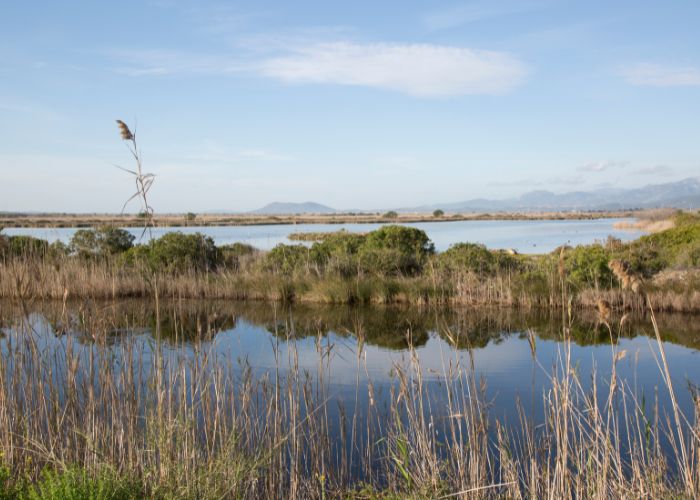MALLORCA – Two juvenile flamingos have been spotted in the Balearic Islands’ main freshwater wetland. Moreover, it is an event that puzzles scientists. However, according to experts, it is a result of the water becoming salinated.
In Mallorca’s largest freshwater wetland, the 2,000-hectare Albufera de Alcudia in the north of the island, two flamingo pups have appeared. These were spotted wading and foraging in this bird sanctuary where over 300 species are sighted.
The flamingos were so young that they did not yet have the characteristic pink colour of this elegant species. However, they did dare to leave their hiding place, located in an inaccessible part of the park, where they were born. At the time of their sighting, they were in the company of two adult flamingos. According to specialists, the two cubs both came from different nests.
Also read: Six birds that hibernate in Spanish wetlands
Milestone
Biologists observed, photographed and analysed the chicks for days and determined that they were too small to fly to the Albufera de Alcudia. Therefore, the experts had no doubts: for the first time in the documented history of Balearic ornithology, flamingos have successfully nested in the archipelago.
Earlier in May, those responsible for the Albufera Park discovered unusual behaviour in the colony of these migratory birds. Fifteen of them had started nesting and incubating eggs in a very remote enclave of the Natural Park. They could only be viewed through terrestrial telescopes.
Also read: Global warming changing the behavioural habits of birds
“Flamingos occasionally run tests to see if they can breed in a particular area,” explains Manolo Suárez. He is one of the leading figures in the ornithology of the Balearic Islands and a coordinator specialising in birds of the environmental group Grupo Ornithológico Balear (GOB).
However, after a few weeks, the first two flamingos born in Mallorca were observed. This confirms this ecological milestone for the entire island area. A remarkable event, according to biologists consulted by the newspaper El Mundo. Not good news from the point of view of preserving the ecosystem in which they were first born.
Water is gradually becoming salty
The fact that keeps the local scientific community on the alert and carries an implicit message: When flamingos breed in a traditionally fresh wetland, it’s because the water is changing. The water is gradually becoming salty. It loses its original composition and this affects the balance of the habitat.
Factors such as the historical overexploitation of groundwater, the transfer of water and the decrease in the contribution of rainwater entering the drainages, accentuated by climate change, increase the salinity of the water in the wetland, experts explain.
“Good and bad news at the same time”
“La Albufera has become very salinised over the past 15 years and that is bad news,” said Maties Rebassa, director of the park, underlining the uniqueness of the area. “There is no other freshwater wetland in the Balearic Islands and it is a rare type of ecosystem in Spain.”
Ornithologist Suárez also makes the same diagnosis. He sees in the news a symptom of the transformation of the environment. “We expected something like this in the Balearic Islands, but thought it would happen sooner in brackish water areas where there are already more stable and numerous colonies of flamingos, such as in Ibiza or the south of Mallorca, in the Salinas de Campos”. Here you can see flamingos all year round before they migrate to North Africa.
To the surprise and astonishment of ornithologists, the first birth occurred in a wetland with native freshwater, with less salinity, indicating that the waters there have changed enough for this species to decide to raise its offspring there.


